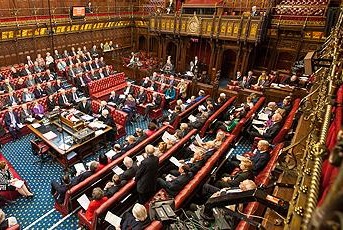Report outlines constitutional concerns raised by Brexit immigration bill
With Brexit firmly back in the news this month, the House of Lords Constitution Committee last week published a short report on the Immigration and Social Security Co-ordination (EU Withdrawal) Bill.
 Image credit: UK GovernmentThe 8-page report is here.
Image credit: UK GovernmentThe 8-page report is here.
The report notes that "[i]mmigration is a complicated policy area which has been repeatedly legislated for in recent years" and it finds that the Immigration and Social Security Co-ordination Bill "threatens to add to that complexity."
The Lords Constitution Committee warns: "We are concerned that the provisions in this Bill are broad and some are worded in vague or subjective terms. They risk making a complex area of the law even more difficult to navigate and understand for practitioners and individuals alike. The statute book requires clarity rather than obscurity and provisions such as these threaten to frustrate essential ingredients of the rule of law."
The Committee adds: "We have previously recommended that immigration law be consolidated. We reiterate this recommendation in the strongest possible terms, as consolidation will be even more urgent following the passage of this Bill."
The Committee is also concerned by the Bill's broad delegated powers, including Henry VIII powers, noting that "there is little policy detail as to their intended use; insufficient safeguards and scrutiny processes in relation to the use of these powers."
The Committee says it is "constitutionally unacceptable" that the Government is seeking such broad and permissive powers regarding freedom of movement.
On the issue of retained EU law, the Committee states: "We have previously raised concerns about bills relating to Brexit providing for elements of retained EU law to be amended by new powers which are not subject to the scrutiny safeguards set out in the European Union (Withdrawal) Act 2018, the operation of which are the result of careful and detailed consideration.
"The Bill effectively changes significant areas of immigration law from primary into secondary legislation, weakening the parliamentary scrutiny that will be required for any future amendment or repeal.
"The Government must provide a justification for treating this area of EU law differently from the other EU-related law covered by the European Union (Withdrawal) Act 2018. If it is unable to do so, regulations made under this Bill should not be subject to weaker forms of parliamentary scrutiny than equivalent measures made under the 2018 Act."